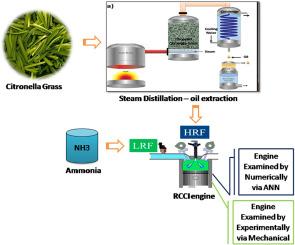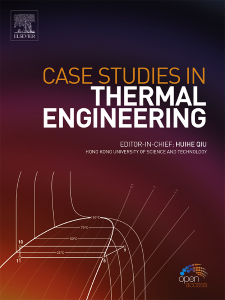An experimental and ANN analysis of ammonia energy integration in biofuel powered low-temperature combustion engine to enhance cleaner combustion
IF 6.4
2区 工程技术
Q1 THERMODYNAMICS
引用次数: 0
Abstract
In the pursuit of global net-zero emissions targets and cleaner combustion technologies, researchers are increasingly turning to innovative solutions. Ammonia, as a carbon-free fuel, holds promise for achieving low emissions and efficient combustion. This study explores the potential synergies of various ammonia shares (20 %, 40 %, and 60 %) combined with Citronella biofuel in a Low-Temperature Combustion (LTC) Reactivity Controlled Compression Ignition (RCCI) engine. Comparative analysis between a 40 % ammonia blend Citronella biofuel (A40) and a Standard Diesel (SDL) in an RCCI engine demonstrates significant reductions in oxides of nitrogen (by 17 %), carbon dioxide (by 6.6 %), and smoke (by 9.8 %), along with a notable enhancement in Brake Thermal Efficiency (BTE) by 5.4 % for A40. The validation of results using an Artificial Neural Network (ANN) model shows robust coefficients of determination (97 %), high R values (0.9945–0.9995), and low Root Mean Square Error values (ranging from 0.0219 to 0.0483). These findings strongly support the efficacy of the A40 blend, positioning it as a promising and viable alternative fuel for achieving cleaner combustion in LTC-RCCI engines.

生物燃料驱动的低温内燃机中氨能量集成的实验和 ANN 分析,以提高燃烧清洁度
为了实现全球净零排放目标和清洁燃烧技术,研究人员越来越多地转向创新解决方案。氨作为一种无碳燃料,有望实现低排放和高效燃烧。本研究探讨了在低温燃烧(LTC)反应控制压燃(RCCI)发动机中将不同比例的氨(20%、40% 和 60%)与香茅生物燃料结合使用的潜在协同效应。在 RCCI 发动机中,40% 的氨混合香茅生物燃料(A40)与标准柴油(SDL)之间的比较分析表明,A40 的氮氧化物(减少 17%)、二氧化碳(减少 6.6%)和烟雾(减少 9.8%)显著减少,制动热效率(BTE)显著提高 5.4%。使用人工神经网络(ANN)模型对结果进行的验证表明,该模型具有稳健的决定系数(97%)、较高的 R 值(0.9945-0.9995)和较低的均方根误差值(0.0219-0.0483)。这些研究结果有力地证明了 A40 混合燃料的功效,并将其定位为在 LTC-RCCI 发动机中实现更清洁燃烧的一种有前途且可行的替代燃料。
本文章由计算机程序翻译,如有差异,请以英文原文为准。
求助全文
约1分钟内获得全文
求助全文
来源期刊

Case Studies in Thermal Engineering
Chemical Engineering-Fluid Flow and Transfer Processes
CiteScore
8.60
自引率
11.80%
发文量
812
审稿时长
76 days
期刊介绍:
Case Studies in Thermal Engineering provides a forum for the rapid publication of short, structured Case Studies in Thermal Engineering and related Short Communications. It provides an essential compendium of case studies for researchers and practitioners in the field of thermal engineering and others who are interested in aspects of thermal engineering cases that could affect other engineering processes. The journal not only publishes new and novel case studies, but also provides a forum for the publication of high quality descriptions of classic thermal engineering problems. The scope of the journal includes case studies of thermal engineering problems in components, devices and systems using existing experimental and numerical techniques in the areas of mechanical, aerospace, chemical, medical, thermal management for electronics, heat exchangers, regeneration, solar thermal energy, thermal storage, building energy conservation, and power generation. Case studies of thermal problems in other areas will also be considered.
 求助内容:
求助内容: 应助结果提醒方式:
应助结果提醒方式:


